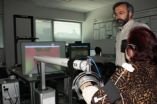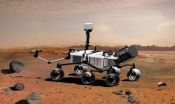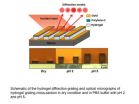(Press-News.org) CHAMPAIGN, Ill. — A new study in the journal Cognition overturns a decades-old theory about the nature of attention and demonstrates that even brief diversions from a task can dramatically improve one's ability to focus on that task for prolonged periods.
The study zeroes in on a phenomenon known to anyone who's ever had trouble doing the same task for a long time: After a while, you begin to lose your focus and your performance on the task declines.
Some researchers believe that this "vigilance decrement," as they describe it, is the result of a drop in one's "attentional resources," said University of Illinois psychology professor Alejandro Lleras, who led the new study. "For 40 or 50 years, most papers published on the vigilance decrement treated attention as a limited resource that would get used up over time, and I believe that to be wrong. You start performing poorly on a task because you've stopped paying attention to it," he said. "But you are always paying attention to something. Attention is not the problem."
Lleras had noticed that a similar phenomenon occurs in sensory perception: The brain gradually stops registering a sight, sound or feeling if that stimulus remains constant over time. For example, most people are not aware of the sensation of clothing touching their skin. The body becomes "habituated" to the feeling and the stimulus no longer registers in any meaningful way in the brain.
In previous studies, Lleras explored the limits of visual perception over time, focusing on a phenomenon called Troxler Fading: when continual attention to a stationary object in one's peripheral vision can lead to that object's complete "disappearance" from view.
"Constant stimulation is registered by our brains as unimportant, to the point that the brain erases it from our awareness," Lleras said. "So I thought, well, if there's some kind of analogy about the ways the brain fundamentally processes information, things that are true for sensations ought to be true for thoughts. If sustained attention to a sensation makes that sensation vanish from our awareness, sustained attention to a thought should also lead to that thought's disappearance from our mind!"
In the new study, Lleras and postdoctoral fellow Atsunori Ariga tested participants' ability to focus on a repetitive computerized task for about an hour under various conditions. The 84 study subjects were divided into four groups:
The control group performed the 50-minute task without breaks or diversions.
The "switch" group and the "no-switch" group memorized four digits prior to performing the task, and were told to respond if they saw one of the digits on the screen during the task. Only the switch group was actually presented with the digits (twice) during the 50-minute experiment. Both groups were tested on their memory of the digits at the end of the task.
The "digit-ignored" group was shown the same digits presented to the switch group during the task, but was told to ignore them.
As expected, most participants' performance declined significantly over the course of the task. But most critically, Lleras said, those in the switch group saw no drop in their performance over time. Simply having them take two brief breaks from their main task (to respond to the digits) allowed them to stay focused during the entire experiment.
"It was amazing that performance seemed to be unimpaired by time, while for the other groups performance was so clearly dropping off," Lleras said.
This study is consistent with the idea that the brain is built to detect and respond to change, Lleras said, and suggests that prolonged attention to a single task actually hinders performance.
"We propose that deactivating and reactivating your goals allows you to stay focused," he said. "From a practical standpoint, our research suggests that, when faced with long tasks (such as studying before a final exam or doing your taxes), it is best to impose brief breaks on yourself. Brief mental breaks will actually help you stay focused on your task!"
INFORMATION:
Lleras is a researcher at the university's Beckman Institute for Advanced Science and Technology.
Editor's notes: To reach Alejandro Lleras, e-mail: alleras@illinois.edu.
The paper, "Brief and Rare Mental 'Breaks' Keep You Focused: Deactivation and Reactivation of Task Goals Pre-empt Vigilance Decrements," is available from the News Bureau.
Brief diversions vastly improve focus, researchers find
2011-02-09
ELSE PRESS RELEASES FROM THIS DATE:
JAMA features NJIT biomedical engineer helping stroke patients
2011-02-09
The Journal of the American Medical Society ("Medical News & Perspectives", Jan. 19, 2011) featured the research of NJIT Associate Professor Sergei Adamovich, a biomedical engineer. Adamovich and his research partners, physical therapists Alma Merians, PhD, PT, and Eugene Tunik, PhD, PT, at the University of Medicine and Dentistry of New Jersey, have developed innovative robotic and virtual reality-based video game therapies to help stroke patients regain use of hands and arms.
JAMA reported that the efforts of this team are making headway. Twenty-four patients who ...
Why leatherback turtles linger in South Pacific Gyre, and why it matters
2011-02-09
VIDEO:
Tagging and tracking leatherback sea turtles has produced new insights into the turtles' behavior in a part of the South Pacific Ocean long considered an oceanic desert. The new data...
Click here for more information.
Leatherbacks. They are the Olympians of the turtle world – swimming farther, diving deeper and venturing into colder waters than any other marine turtle species. But for all their toughness, they have still suffered a 90 percent drop in their population ...
Tool makes search for Martian life easier
2011-02-09
RICHLAND, Wash. – Finding life on Mars could get easier with a creative adaption to a common analytical tool that can be installed directly on the robotic arm of a space rover.
In a recent paper published online in the journal Planetary and Space Science, a team of researchers propose adding a laser and an ion funnel to a widely used scientific instrument, the mass spectrometer, to analyze the surfaces of rocks and other samples directly on Mars' surface. The researchers demonstrated that the combined system could work on the spot, without the sample handling that mass ...
Hydrogels used to make precise new sensor
2011-02-09
WEST LAFAYETTE, Ind. - Researchers are developing a new type of biological and chemical sensor that has few moving parts, is low-cost and yet highly sensitive, sturdy and long-lasting.
The "diffraction-based" sensors are made of thin stripes of a gelatinous material called a hydrogel, which expands and contracts depending on the acidity of its environment.
Recent research findings have demonstrated that the sensor can be used to precisely determine pH - a measure of how acidic or basic a liquid is - revealing information about substances in liquid environments, said ...
Detecting pathogens in waterways: An improved approach
2011-02-09
This press release is available in Spanish.
U.S. Department of Agriculture (USDA) scientists have come up with a way to detect pathogenic Escherichia coli and Salmonella bacteria in waterways at lower levels than any previous method. Similar methods have been developed to detect pathogenic E. coli in meat products, but the approach by the scientists with USDA's Agricultural Research Service (ARS) represents a first for waterways.
ARS is USDA's principal intramural scientific research agency, and this research supports the USDA priority of ensuring food safety.
When ...
UT Study: Charismatic leadership can be measured, learned
2011-02-09
KNOXVILLE -- How do you measure charisma? That's the question UT professor Kenneth Levine seeks to answer.
Much has been written in business management textbooks and self-help guides about the role that personal charisma plays in leadership. But according to a newly published study co-authored by Levine, a University of Tennessee, Knoxville, communications studies professor, until recently no one was able to describe and measure charisma in a systematic way.
Levine said the large amount of academic literature on charismatic leadership never defined what it means to ...
The hitch in the drug? The itch in the drug
2011-02-09
Scratching deep beneath the surface, a team of researchers from the University of California, San Diego School of Medicine and three South Korean institutions have identified two distinct neuronal signaling pathways activated by a topical cream used to treat a variety of skin diseases. One pathway produces the therapeutic benefit; the other induces severe itching as a side effect.
The findings, published in this week's early online edition of the Proceedings of the National Academy of Sciences, point to the possibility of designing future drugs that effectively treat ...
Dramatic improvement in Parkinson disease symptoms
2011-02-09
New Rochelle, NY, February 8, 2011—Successful intranasal delivery of stem cells to the brains of rats with Parkinson disease yielded significant improvement in motor function and reversed the dopamine deficiency characteristic of the disease. These highly promising findings, reported in Rejuvenation Research, a peer-reviewed journal published by Mary Ann Liebert, Inc. highlight the potential for a noninvasive approach to cell therapy delivery in Parkinson disease–a safer and effective alternative to surgical transplantation of stem cells. The article is available free online. ...
NRL researchers view the sun in 3-D
2011-02-09
Beginning on February 6, 2011, the two STEREO spacecraft are 180 degrees apart providing Naval Research Laboratory (NRL) scientists with a 360-degree view of the Sun. NASA's STEREO (Solar Terrestrial Relations Observatory) spacecraft were launched on October 25, 2006, and have been gathering spectacular images of solar activity, especially solar storms, since the mission began.
A key component of the STEREO mission is NRL's Sun Earth Connection Coronal and Heliospheric Investigation (SECCHI), a suite of five scientific telescopes that observe the solar corona and inner ...
Scientists develop method to identify fleetingly ordered protein structures
2011-02-09
LA JOLLA, CA – February 8, 2011 - A team of scientists from The Scripps Research Institute and the University of California, San Diego (UCSD) have developed a novel technique to observe previously unknown details of how folded structures are formed from an intrinsically disordered protein. The insights could help scientists to better understand the mechanism of plaque formation in neurodegenerative disorders such as Parkinson's and Alzheimer's diseases.
The results of the study, which has broad implications for the field, were recently published in an advanced, online ...




